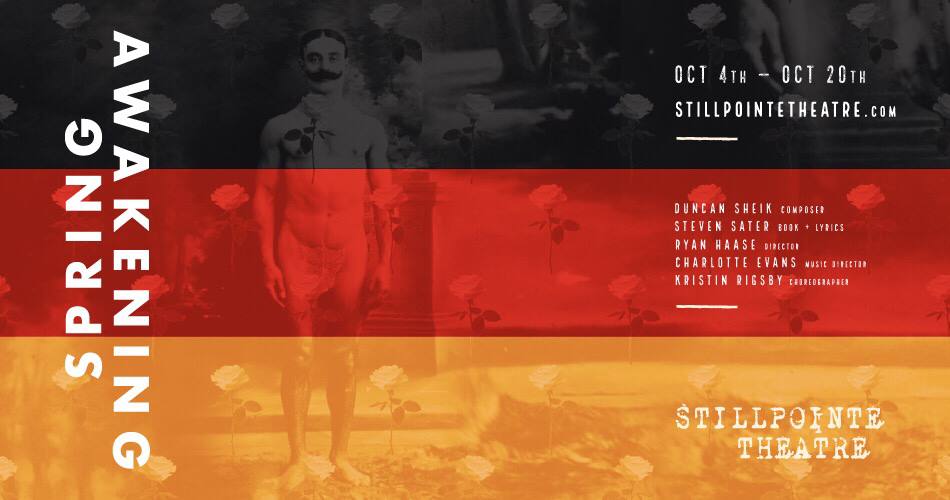In what ways have we cloaked, and even hidden from ourselves, the secret bargains we have made with our own devils? Don’t we all have our own junk? Isn’t it all just the bitch of living? Stillpointe Theatre understands all too well these concepts of self-discovery, these moralistic masquerades that stifle the expression youth as they blossom into adults. Preparing to round out their seventh season, Stillpointe Theatre presents Spring Awakening, Directed by Ryan Haase with Musical Direction by Charlotte Evans and Choreography by Kristin Rigsby.
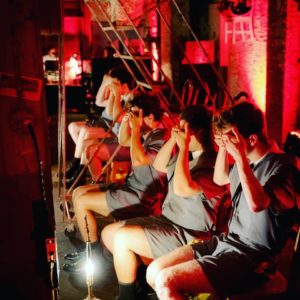
The exhilarating venue is enough to give you breathtaking pause from the moment you enter Area 405. Director and Scenic Designer Ryan Haase has draped his concept for the show over the space like a Victorian lace tapestry. It is subtle yet mesmerizing. Accentuating his visual masterpiece is the work of Lighting Designer Kateri Pelton of Parlights. The shadeless lamps upon the floor create a macabre upward glow that is oddly warming once they are turned on. Light and shadow are interwoven into Haase’s scenic work and layout to create an additional character in the play, one that moves with the tone of the performance. The shadowy crest of delumination that settles over Wendla and Melchior for “The Word of Your Body” is a fine example of the way such instruments of light and darkness wend their way into the work.
There is a refined grace to the way Haase’s pacing of the show flows. Haase creates seamless connections from moment to moment; each scene and song breathes into the next without ever pausing for breath. It is strikingly poetic. The positioning of the ensemble when they are not in focus of the center action is equally striking and the sound created, breathtaking. Musical Director Charlotte Evans take Haase’s blocking and placement of the ensemble from the exterior periphery of the in-the-round staging, and swells forth moments of emotional intent in various numbers. Hearing these mellifluous and at times haunting voices creep up from behind the audience and alongside of them is chilling.
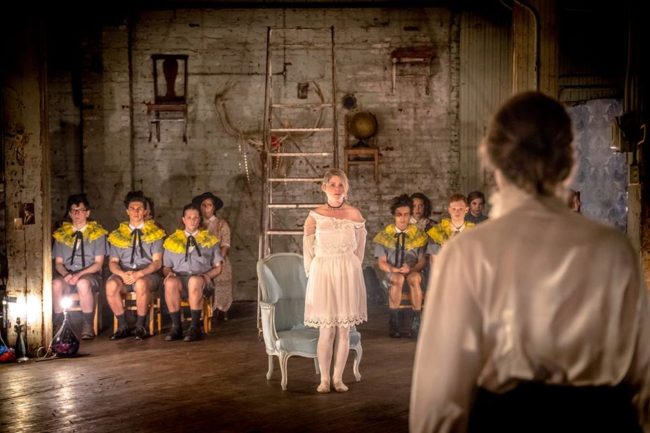
Haase, the creative team, and company have a near-flawless production on their hands save for one conceptual element that fails to connect on the rigorously strengthened level that the rest of the performance rests upon. The use of cell phones throughout the production is inconsistent and unclear. If Haase is attempting to show a modern world where the students are reflecting upon historic learnings, the use of the cellphones is under-utilized and does not strongly reflect this concept. If Haase is attempting to draw a profound connection between the past and present with their presence, this also does not land as intended. In addition to feeling slightly out of place and disconnected from the otherwise stunning beauty of the show, the cell phones seem to vanish almost entirely for a large portion of the second act. Haase and the company have a strong enough production on their hands, visually, vocally, and emotionally and the use of the phones doesn’t enhance it in any way.
Part of what makes Charlotte Evans musical direction so successful is the superbly balanced musical pit, led by Stacey Antoine on keyboard. There is a sound shield wall that surrounds the live pit (tucked away in a corner of the play space) to keep the musicians from overwhelming the performers in a space that is not designed for the sounds of a live musical theatre performance. Another critical component that ties the musical success of the production together is the choreographic work of Kristin Rigsby. The various themes that thread their way through the musical numbers are enacted in the movements that Rigsby puts into her dance routines, which channel sentiment and emotion rather than particular styles or steps. “My Junk” has a playful feel about its choreographic movement, not unlike children racing about on a playground, while the erratic, frenetic build-up of the choreography in “Touch Me” mimics the sexual tension that mounts and erupts from an orgasm.
There is a slight discord within the internal structuring of the show’s sartorial selection; Costume Designer Ben Kress assembles an array of dresses that capture the notion of a time and world forgotten for the girls and a series of daunting uniforms for the boys. While there is no exacting consistency, Kress’ work illuminates the spirit of individualism, at least for the girls, in what he chooses to work with. Hair and Makeup, designed by Danielle Robinette, compliments Kress’ aesthetic and draws a connecting line between the time of the world of the performance and the reality of modernity.
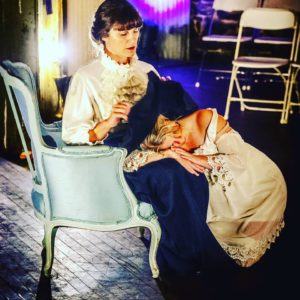
Following the traditional casting scope where all of the adult male and female roles are played by one male and one female actor, Haase casts B. Thomas Rinaldi and Courtney Proctor in these roles, and to great effective success. While Proctor’s female has fewer main-stream scenes, when she is Wendla’s Mother, she is terrifying and filled with unruly emotions that could almost be kindred spirits with those burgeoning in her daughter. Rinaldi’s characterizations are somewhat severe; there is a humanity and almost a vulnerability experienced in his portrayal of Moritz’ father, particularly in the scene that surrounds and penetrates “Left Behind.”
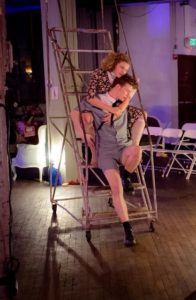
The ensemble (all named characters outside of the three principals but comprised of Katie Ray Bogden, Sarah Burton, Anthony Case, Max Cortezi, Seth Julius Fallon, Compton Little, Chelsea Paradiso, Josh Schoff, Caitlin Weaver, Amber Wood) deliver a passionate sound that captivates the soul whether in furious angst or in reverent sobriety. Their stomping chanting enthusiasm dominates numbers like “Totally Fucked” whilst the somber, melancholy strength of their sound welcomes forth the show’s finale in “The Song of Purple Summer.” Each of the performers is striking in their own right’ standout performances include the delectable counter-tenor momentarily featured on Max Cortezi playing Otto, during “Touch Me” and the overall interactions he has with Melitta (Compton Little.) Hanschen (Seth Julius Fallon) and Ernst (Josh Scoff) have equally moving voices and expressions during “The Word of Your Body (Reprise).”
There is a darkness that permeates most of the performance; sometimes it is subtle and drifting about the way the adults are perpetually floating through the house and all around the stage’s perimeter. Other times is it solid, forceful, and confrontationally in the face of the audience. This is the case for “The Darkness I Know Well”, the duet that gives Martha (Katie Rey Bogdan) her moment to roar in the flames of the lime light. With a trembling ferocity that shakes her vocal performance, Bogdan’s primary focus in the number is channeling the repressed emotions of her character. Isle (Amber Wood) joins her for the latter half of the duet and brings a vocal reckoning to the number. Woods possesses a savage, Bohemian quality for her portrayal of Isle, though it isn’t readily shown until she encounters Moritz just before she joins him in her half the double-named duet “Don’t Do Sadness/Blue Wind.” Expressive and sublimely serene, Woods delivers a stellar performance in this number.
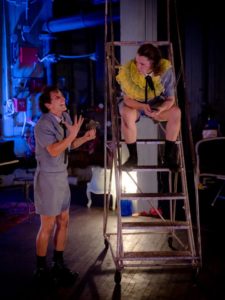
Spastically strung, Moritz Stiefel (Nick Fruit) jitters on the edge of sanity both emotionally and physically. Fruit is bursting with exasperating expressions that manifest themselves across his animated facial features as well as physically throughout his posture and body language. There is a powerhouse force that jettisons Fruit forward during numbers like “The Bitch of Living” though it is not without its vocal soundness. There is a convulsive eruption of all the character’s emotions that spurts in surges of pain into Fruit’s rendition of “And Then There Were None” but his shining moment comes from the evocative, gut-punching delivery of “Don’t Do Sadness.”
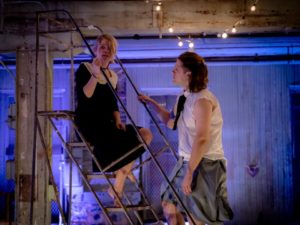
Boy and girl, the story is as old as the planet itself. Their names in this story are Melchior (Paul Kennedy) and Wendla (Jennie Phelps.) Their chemistry divine, their interactions enigmatic; together and apart on the stage the pair are entrancing. When Phelps first introduces herself to the audience as the curious yet desperately confounded and naïve Wendla, there is no doubting her vocal capabilities. “Mamma Who Bore Me” is a power ballad belt that showcases her vocal prowess straight away. And while Kennedy has similar such songs, his emotional release is more gradual, building and mounting before roaring its way out during “Totally Fucked.” There are counter balanced numbers for Kennedy’s Melchior as well, like the emotional gap-bridge number “The Mirror-Blue Night” which reconciles his actions with Wendla when they are alone in the previous scene to what is about to happen to the pair. Both seize their roles with fervent liveliness and an honesty that is soul-searing.
Seats are selling rapidly, with several performances nearing their sell-out point so do not wait to get tickets to see Spring Awakening this fall with Stillpointe Theatre.
Running Time: 2 hours and 10 minutes with one intermission
Spring Awakening plays through October 20, 2018 with Stillpointe Theatre at Area 405— 405 East Oliver Street in Baltimore, MD. Tickets are available at the door or in advance online. Reservations are strongly recommended as seating is limited.

